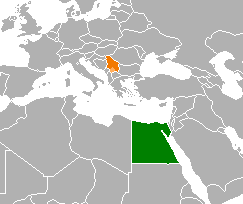You can help expand this article with text translated from the corresponding article in Serbian. (May 2025)Click [show] for important translation instructions.
|
 | |
Egypt | Serbia |
|---|---|
Egypt and Serbia maintain diplomatic relations established in 1908. From 1918 to 2006, Egypt maintained relations with the Kingdom of Yugoslavia, the Socialist Federal Republic of Yugoslavia (SFRY), and the Federal Republic of Yugoslavia (FRY) (later Serbia and Montenegro), of which Serbia is considered shared (SFRY) or sole (FRY) legal successor. [1]

